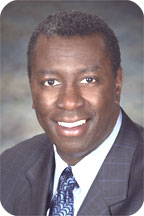We wrap up our tour of the At Large #1 field with a visit with Chris Oliver, who currently serves as Trustee in HCC District IX. A businessman and graduate of TSU, Oliver has worked as a Congressional aide and as an Equal Employment Opportunity specialist with the US Department of Labor. During his service as HCC Trustee, he has been an advocate for extending the college’s reach into previously underserved neighborhoods. Here’s what we talked about:
(Note: This interview took place before the Supreme Court ruling that required a repeal or referendum on HERO.)
You can see all of my interviews as well as finance reports and other information on candidates on my 2015 Election page.


can you believe the nerve of these council members,our streets are in the worse possible shape in the history of Houston , we have almost no money and these council members think they deserve 4 year presidential terms,i am going to run to the voting booth and vote against extending councilmemebr terms , are they high????????.
joshua
Joshua, I believe you are judging them by inappropriate metrics. As many hundreds of examples you can come up with regarding potholes, Houston’s majority of streets are not that bad compared to aging cities up north or east. And if you’re going to use history as an example, just how many miles of streets did Houston have for say the first hundred years of it’s existence? How do you think those streets would have fared under the far greater number of vehicles and often far heavier vehicles most major thoroughfares deal with?
Then you comment how Houston has “no money” as though there was the slightest bit of truth to that comment. Houston takes in over $5.1 Billion dollars a year via the various components of it’s total budget, hardly a penniless city by any stretch of the imagination. Comparing the city to other large cities, it’s bonded debt is easily covered by revenues and even unfunded pension liabilities are far, far less than many large cities around the country. Most of those cities have so much programmed spending that they cannot easily change gears with new administrations nor do they have the flexibility Houston has in tough economic years.
Personally, a better scorecard for elected leaders would include how they spent what came in, where their focal points were, and what were their plans for the future to address various concerns. That is where they would best taken to task, the continued method of under funding pensions for “the next guy” to cover or grandiose plans to enhance parks like Memorial with sweeping schemes they won’t even offer a basic prince range for. Or decisions to fund crime labs apart from the county and duplicate services, everything we read about the latest version suggesting they keep having the same problems as the last one had no matter how many PhD’s we place on the board or how much money we throw at the TOP of the organization.
And whatever one thinks about a mayor’s priorities, in a strong mayor form of city government, it seems reasonable to lay most strategic flops on that position, then maybe assess scores for council members based on their voting record (how often do most of them vote for the same things as the mayor, 85% or more?) or what they champion. When they override the mayor to vote in slush funds, don’t they deserve an extra helping of “WTF” when they are concurrently whining about having to prioritize spending or looking at future deficits? Some might want to add or subtract points for those who don’t want voters to have a more direct say (food ordinance, HERO, etc.) in fear of the voters being swayed by evil people to vote the wrong way, whatever “wrong” may mean.
But given the relative quality of those elected wanting more time in office, I’m forced to agree with you for once. I think an informed electorate is the best form of term limit but local officials keep making the same mistakes time and again while no one holds them accountable for it so you accept formal limits as a needed evil.
Well that settles it. Kuffner, Steven, Joshua, and I all agree to vote against the term limit bill. No way it passess. When have all of us agreed on anything?
🙂
Excuse me “Charter Amendment”
Considering I worked with Clymer Wright’s group to get term limits for the City of Houston, my vote is not only no, it is hell no.
https://en.wikipedia.org/wiki/Clymer_Wright